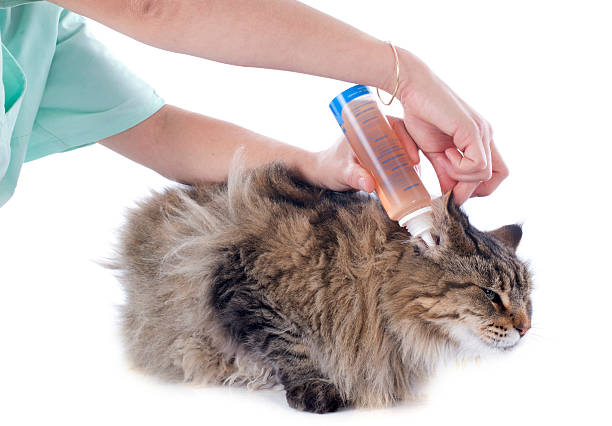Cat Ear Infection Home Remedies: Safe & Natural Solutions

If your cat is scratching their ears, shaking their head, or has a foul odor coming from their ears, they might have an ear infection. While severe cases require veterinary care, mild infections can often be treated at home with safe, natural remedies.
In this article, we’ll explore effective home remedies for cat ear infections, along with prevention tips and FAQs.

Symptoms of a Cat Ear Infection
Before trying home treatments, confirm your cat has an ear infection. Common signs include:
- Excessive scratching at the ears
- Head shaking or tilting
- Redness or swelling inside the ear
- Dark, waxy, or foul-smelling discharge
- Scabs or hair loss around the ears
- Loss of balance (in severe cases)
If symptoms worsen or persist beyond 48 hours, consult a vet immediately.
6 Safe Home Remedies for Cat Ear Infections
1. Apple Cider Vinegar (Antifungal & Antibacterial)
✅ How to use:
- Mix 1 part raw, unfiltered apple cider vinegar with 1 part distilled water.
- Soak a cotton ball in the solution and gently wipe the outer ear (avoid deep insertion).
- Use once daily for 3-5 days.
⚠️ Avoid if: The ear has open wounds (it may sting).
2. Coconut Oil (Soothes & Fights Infection)
✅ How to use:
- Warm 1 tsp organic, virgin coconut oil until liquid (not hot).
- Apply a few drops into the ear and massage the base gently.
- Wipe away excess wax with a cotton ball.
- Repeat every other day for a week.
3. Green Tea (Natural Antiseptic)
✅ How to use:
- Steep a green tea bag in hot water for 5 minutes, then cool.
- Dip a cotton ball in the tea and wipe the outer ear.
- Use twice daily for mild infections.
4. Aloe Vera Gel (Reduces Inflammation)
✅ How to use:
- Use pure, alcohol-free aloe vera gel.
- Apply a small amount to the outer ear to soothe irritation.
- Do NOT insert deep into the ear canal.
5. Olive Oil (Softens Wax & Smothers Mites)
✅ How to use:
- Warm 1 tsp olive oil slightly (test on your wrist first).
- Apply 2-3 drops into the ear and massage gently.
- Wipe away loosened debris with a cotton pad.
- Use once daily for 5 days.
6. Probiotics (Boosts Immune System)
- Add cat-safe probiotics to their food to help fight infections naturally.
- Supports gut health, which strengthens immunity.
When to See a Vet?
🚨 Seek immediate veterinary care if:
- There’s blood or pus in the ear.
- Your cat is in extreme pain or loses balance.
- The infection doesn’t improve in 2-3 days.
- Your cat develops a fever or lethargy.
Prevention Tips for Cat Ear Infections
✔️ Clean ears regularly with a vet-approved ear cleaner.
✔️ Keep ears dry (moisture promotes bacterial growth).
✔️ Check for parasites like ear mites.
✔️ Boost their diet with omega-3 fatty acids (reduces inflammation).
✔️ Avoid cotton swabs (can push debris deeper).
FAQs About Cat Ear Infections
1. Can I use hydrogen peroxide for my cat’s ear infection?
❌ No! Hydrogen peroxide can irritate the sensitive ear canal. Stick to gentler remedies like diluted apple cider vinegar or olive oil.
2. Are cat ear infections contagious?
✅ Yes, if caused by ear mites or fungi. Isolate infected cats and wash bedding frequently.
3. How long does a cat ear infection last?
- Mild cases: 3-7 days with home treatment.
- Severe cases: 1-2 weeks with vet-prescribed medication.
4. Can food allergies cause ear infections in cats?
✅ Yes, allergies can lead to chronic ear inflammation. Try an elimination diet if infections recur.
Conclusion
Mild cat ear infections can often be treated at home with apple cider vinegar, coconut oil, and green tea rinses. However, if symptoms persist, consult a vet to prevent complications like hearing loss.
By maintaining regular ear cleaning, a healthy diet, and parasite prevention, you can help keep your cat’s ears infection-free.
SEO Keywords:
- Cat ear infection home remedy
- How to treat cat ear infection at home
- Natural remedies for cat ear mites
- Cat ear wax removal home treatment
- Are cat ear infections contagious
- Best home treatment for cat ear infection


